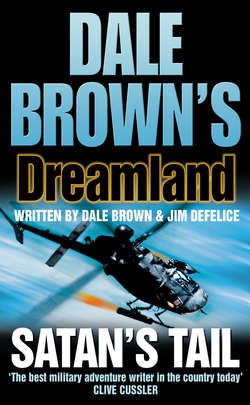Читать книгу Satan’s Tail - Dale Brown - Страница 21
Near Karin, Somalia, on the Gulf of Aden 4 November 1997 1731
ОглавлениеFatigue stung Ali’s eyes as he walked up the gangplank to the large ship. He had not slept since the battle. It was not simply a matter of restlessness, or even the demands of his position. He feared that he would dream of his son the same way he had dreamed of his wife after her death. The dreams had been vivid and heart-wrenching; he could not face such an ordeal now.
The ship was nearly twice as long as his boats. Once part of the Russian navy, it had fallen into great disrepair after being delivered to Somalia as part of a deal the communists used to sway the corrupt government years before. The ship had fallen under the control of a warlord in Mogadishu, who had agreed to donate it to the Islamic cause in exchange for weapons and cash.
Rust stained the hull and the odor of rot hung heavy over the ship. Netting and fake spars had been strategically placed ahead of the forecastle to make the vessel look more like a merchant trawler from the air. Ali had no illusion that this would fool a discerning eye intent on discovering the ship; he merely wanted to make it easier to overlook.
‘Admiral Ali,’ said the ship’s captain, greeting him as he came aboard. ‘It is a pleasure, sir.’
‘I am not an admiral,’ Ali told him.
‘Yes, sir,’ said the captain. He led the way around the deck of the ship, showing Ali to the bridge.
‘I wish to see the engines,’ said Ali.
‘The engine room,’ said the captain doubtfully. When Ali did not respond, the captain dutifully led him to a ladder and they descended into the bowels of the ship. The stench of rot increased as they went down; the way was dark and the passages narrow. Ali noticed several sets of pipes and wires that were broken, and there were bits of the decking that seemed as if a shark had bitten through.
In truth, the engine room was not as bad as he expected when he saw the captain’s frown. Water slopped along the floor, but it was less than an inch. The massive 40 DM diesels seemed clean enough, and while the space smelled of diesel oil, Ali had been on several ships in the Egyptian navy that were much worse. There were two men on duty, one of whom did not speak Arabic – a Polish engineer familiar with the engines whom the captain had somehow found and managed to hire.
‘He is, unfortunately, a drinker,’ said the captain as they went back topside. ‘But he knows the engines.’
‘You have done very well getting the ship here,’ said Ali. ‘But you have much more work to do.’
‘I understand, Captain.’
‘We will obtain the missiles in a few days. How long will it take you to install them?’
Ali listened as the ship’s commander told him that he had two men trained by the Russians to work with the systems, and several others willing to work with them. This neither answered the question nor impressed Ali.
‘Two brothers from Egypt will join you tomorrow and help with the work,’ Ali told the captain. ‘They will help you determine how much additional laborers are needed. One of my men will install a radio system with an encryption system.’
‘Thank you, Captain.’
Ali nodded. ‘We need a name.’ The vessel looked the opposite of a warship, and giving it a warlike name would be an affront, he thought. It needed something nobler. ‘Sharia.’
The word meant ‘Islamic law’ in Arabic. It was the only true law, the law that would be restored when the jihad was won.
‘It is a good name. Fitting.’
‘Make sure your crew does not embarrass it,’ said Ali, turning to go back to the dock.
